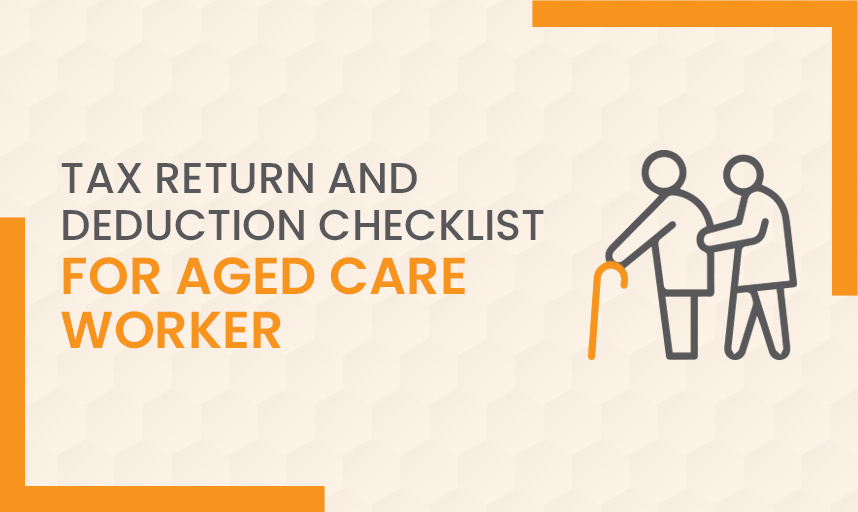Taking care of our elderly loved ones is a noble calling.
As an Aged Care Worker, ensuring their well-being is your priority.
As an aged care worker, you play a vital role in caring for our precious elderly population. Your dedication and compassion make a significant difference in their lives.
Amidst your busy schedule, managing taxes might seem daunting. Don’t worry, this guide simplifies the process and equips you with the knowledge to claim your rightful deductions!
Tax Deductions for Aged Care Workers
As an aged care worker, understanding tax deductions is crucial for maximising your refund. Let’s get into what you need to know:
Income Statement Requirement
Before getting into deductions, ensure you have your income statement from your employer, outlining your earnings for the financial year.
Claiming Deductions: What You Need to Know
To claim deductions, remember two key points:
- You must have personally incurred the expense.
- Keep records of all expenses with receipts or invoices.
Eligible Deductions for Aged Care Workers
As an aged care worker, you can claim deductions for various expenses, including:
Expense | Description |
Car Expenses | Parking costs and tolls for work-related travel between different job locations or to visit clients. |
Union Fees | Any fees paid to professional unions or associations related to your employment. |
Protective Clothing | Costs for work-specific protective gear like masks, gloves, or aprons. |
Equipment and Tools | Expenses for tools or equipment required for your job, such as a stethoscope or laptop. |
Self-Education Costs | Training courses or seminars directly related to improving skills for your current job. |
First Aid Training | Cost of first aid courses if required for emergency situations in your workplace. |
Phone and Internet Expenses | Work-related usage on personal devices, excluding employer-covered expenses. |
Now let’s understand these claimable deductions in detail.
Car Expenses
- Travelling between different jobs on the same day: This applies if you use your car to go from, say, your morning shift at a nursing home to your afternoon job as a nanny.
- Travelling between different workplaces for the same employer: This includes situations like driving between different aged care facilities for the same company.
Claiming methods
- Logbook method: This requires maintaining a record of your car’s work-related usage and expenses.
- Cents per kilometre method: This method involves calculating work-related kilometres and demonstrating their work-related purpose.
Important Note: You cannot claim the cost of commuting between your home and your regular workplace, even if you have a long commute, work outside regular hours, or have split shifts.
Phone and Internet Expenses
- Work-related calls and Internet usage: Apportion your phone and internet bills based on work-related usage, keeping detailed records to justify your claim.
Upskilling and Education
- Courses and training directly related to your current aged care role: Claim the costs of courses that help you improve your skills and knowledge in your current position.
Industry Resources
- Subscriptions to aged care magazines and journals: Claim the full cost of subscriptions to industry-specific publications.
Uniforms and Protective Clothing
- Required uniforms with official logos: Claim the cost of purchasing and maintaining uniforms specific to your workplace.
- Protective clothing and footwear: Claim the cost of items like face masks, lab coats, aprons, gloves, sunglasses, and sun hats if they are required for safety and hygiene.
Other Claimable Expenses
- Laptop depreciation: If you use a personal laptop for work purposes, you can claim depreciation, spreading the cost over several years.
- Home office expenses: If you have a dedicated home office, claim a portion of your rent, utilities, and internet based on the dedicated work area.
- First aid training: If you’re designated as a first-aid provider and need to take training, claim the associated costs.
What You Cannot Claim?
- Costs your employer paid for or reimbursed you for.
- Regular clothing worn to work can also be worn outside of work, even if purchased specifically for work.
- Personal expenses like meals, snacks, or childcare.
Some Additional Tips For Tax Deduction
- File your tax return on time: The due date for individuals to lodge their tax return is usually October 31st of each year. Filing on time can help avoid late filing penalties.
- Utilise tax software or a registered tax agent: Tax software can simplify the process, especially if your tax situation is straightforward. For more complex situations, consider seeking assistance from a registered tax agent who can provide personalised advice and ensure you claim all eligible deductions.
- Keep informed: The ATO website is a valuable resource for tax information and updates. You can find information on specific deductions, tax rates, and how to lodge your return.
You must only claim genuine deductions to avoid penalties or potential prosecution. If you file your return yourself and discover inaccuracies, contact KPG Taxation which has expert tax professionals to help you with necessary changes.
Conclusion
As an aged care worker, tax time doesn’t have to be stressful. By understanding your entitlements, keeping organised records, and seeking professional guidance when needed, you can approach tax season with confidence and potentially receive a significant tax refund.





